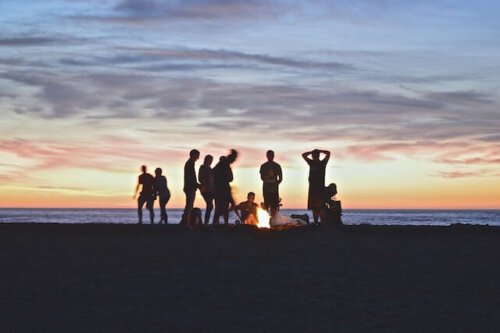Imagine the anticipation of heading to the beach in the evening, eager to build a campfire or bonfire with your loved ones, only to arrive and find out fires are not allowed. It is like having your excitement doused by a wave of disappointment. But even without the crackling flames, there is still magic to be found in the sound of the waves, the feeling of sand between your toes, and the laughter of friends echoing under the starlit sky. Sometimes, the best memories are made when plans go up in smoke.
You have seen it depicted in advertisements, TV shows, and movies—a picturesque scene of people gathering around a blazing bonfire on the beach, laughter filling the air as they enjoy the warmth of the flames against the backdrop of crashing waves. It all seems so idyllic, doesn’t it? However, the reality is often far from it. Many beaches have strict regulations against open fires, dashing the hopes of those seeking to recreate such moments. It is a reminder that not all dreams align with the rules and regulations of the real world.
REASONS YOU ARE NOT SEEING WHERE CAMPFIRES/BONFIRES ARE NOT ALLOWED ANYMORE AT A LOT OF BEACHES
There are several reasons why many beaches have restrictions on building campfires or bonfires. Here are some common factors:
Environmental concerns: Beaches are often delicate ecosystems, and open fires can have a negative impact on the environment. Fires can damage sand dunes, harm vegetation, and disturb nesting areas for marine animals and birds. Additionally, the smoke from fires can contribute to air pollution and affect the overall air quality in the area.
Safety risks: Open fires on the beach pose significant safety risks. They can easily get out of control and spread to surrounding areas, including nearby structures, vegetation, or people. Beaches are often crowded, and the combination of fire, wind, and large numbers of people can be dangerous. Embers from fires can also cause burns or ignite flammable materials.
Fire prevention and management: Managing and preventing fires on beaches requires significant resources and personnel. Local authorities may not have the necessary infrastructure, staffing, or budget to ensure safe fire management practices and respond to emergencies promptly. Restrictions on campfires help reduce the burden on emergency services and minimize the risk of wildfires.
Legal and liability concerns: Open fires on beaches can create legal and liability issues for beach management authorities and local governments. In the event of accidents, injuries, or damage caused by fires, these entities could be held responsible. Restricting campfires helps mitigate these potential legal and financial risks.
Cultural and historical preservation: Some beaches have restrictions on campfires to protect cultural or historical sites in the area. For example, beaches with archaeological significance or areas that are home to endangered species may have specific regulations in place to safeguard these resources.
While not all beaches prohibit campfires or bonfires, many places implement restrictions to balance the enjoyment of visitors with the need to protect the environment, ensure safety, and manage potential risks effectively. It is important to check local regulations and guidelines before planning any beach activities involving open fires.
BEACHES THAT STILL ALLOW CAMPFIRES/BONFIRES ON THE BEACH
No worries, there are still many beaches that still allow campfires/bonfires on the beach.
Several states in the United States have beaches that still allow campfires or bonfires, although the specific regulations may vary within each state. Here are a few states known for having a higher number of beaches that permit campfires or bonfires on the beach:
CALIFORNIA:
Pismo Beach, California: Pismo Beach State Park permits beach bonfires in designated fire rings.
Coronado Beach, California: Coronado Beach in San Diego allows beach bonfires in designated fire rings.
Dockweiler State Beach, California: Dockweiler State Beach in Los Angeles County provides fire pits for beach bonfires.
Huntington Beach, California: Huntington Beach allows beach bonfires in designated fire rings.
FLORIDA:
St. Johns County, Florida: St. Johns County allows beach bonfires with permits and adherence to specific guidelines.
Volusia County, Florida: Volusia County permits beach bonfires in designated fire pits with permits and adherence to regulations.
Navarre Beach, Florida: Navarre Beach in Santa Rosa County allows beach bonfires in designated fire rings.
OREGON:
Nehalem Bay State Park, Oregon: Nehalem Bay State Park on the Oregon coast allows beach campfires in designated areas.
Cape Lookout State Park, Oregon: Cape Lookout State Park permits beach campfires in designated areas.
Pacific City Beach, Oregon: Pacific City Beach allows beach campfires in designated areas.
NORTH CAROLINA:
Cape Hatteras National Seashore, North Carolina: Cape Hatteras National Seashore permits beach bonfires with proper permits and adherence to specific guidelines.
Cape Lookout National Seashore, North Carolina: Cape Lookout National Seashore allows beach bonfires with proper permits and adherence to specific guidelines.
Carolina Beach, North Carolina: Carolina Beach permits beach bonfires with proper permits and adherence to regulations.
MARYLAND:
Assateague Island National Seashore, Maryland: Assateague Island National Seashore permits beach bonfires in designated areas with proper permits and adherence to regulations.
Ocean City, Maryland: Certain sections of Ocean City allow beach bonfires with proper permits and adherence to regulations.
Remember to check with local authorities or beach management for the most current information and permits required for campfires or bonfires on these beaches.
This is just a brief list and there are plenty of beaches that will offer you the opportunity to build your campfire or bonfire on the beach for a wonderful time.
WHAT TO TAKE WITH YOU IF PLANNING TO BUILD CAMPFIRE/BONFIRE ON THE BEACH
When planning to build a campfire or bonfire at the beach, it is important to come prepared and consider safety guidelines and environmental considerations. Here is a list of items you may want to take with you:
Firewood or fire logs: Bring an appropriate amount of firewood or fire logs for your campfire or bonfire. Make sure to check local regulations on the type of wood allowed and any restrictions in place.
Fire starters: Pack some fire starters, such as newspaper, kindling, or firelighters, to help ignite the fire safely and efficiently.
Matches or lighter: Carry matches or a lighter to start the fire. Ensure they are stored in a waterproof container to protect them from moisture.
Fire extinguisher or bucket of water: Safety should be a priority, so have a fire extinguisher or a bucket of water nearby to quickly extinguish the fire if needed. Make sure you know how to use a fire extinguisher properly.
Shovel and rake: Bring a shovel and a rake to create a fire pit and clear the area around it from any flammable materials like dry grass or debris. After using the fire, you can also use these tools to properly extinguish and bury the embers.
Fireproof container: If your beach allows portable fire pits, bring a fireproof container or a fire ring to contain the fire. This helps prevent the fire from spreading and protects the beach surface.
Water bottles: Stay hydrated during your time at the beach by bringing an ample supply of water bottles.
Food and snacks: If you plan to have a beach picnic or cook food over the fire, bring food items, utensils, plates, and any necessary cooking tools.
Blankets or beach chairs: Create a comfortable seating area away from the fire to relax and enjoy the beach ambiance. Bring blankets or beach chairs for everyone to sit on.
Trash bags: Help keep the beach clean by bringing trash bags to collect and dispose of any waste properly. Leave no trace behind.
Remember to check the specific regulations and guidelines of the beach you plan to visit regarding campfires or bonfires. Respect the environment and other beachgoers by practicing fire safety and leaving the beach in the same condition you found it.
SAFETY PRECAUTIONS TO TAKE WHEN BUILDING A CAMPFIRE OR BONFIRE ON THE BEACH
When building a campfire or bonfire on the beach, it is important to prioritize safety to prevent accidents and minimize the risk of fires spreading. Here are some safety precautions to consider:
Check local regulations: Before starting a fire, ensure that fires are allowed on the beach and familiarize yourself with any specific regulations or restrictions in the area.
Choose a safe location: Select a spot away from flammable objects such as vegetation, dry grass, driftwood piles, or buildings. Look for an area with a clear, open space and a non-flammable base like sand or gravel.
Build a fire pit: Dig a shallow pit and surround it with rocks or a metal ring to contain the fire. This helps prevent the fire from spreading and provides a barrier between the flames and the surrounding area.
Clear the surroundings: Remove any debris, leaves, or flammable materials within at least a 10-foot radius around the fire pit. This minimizes the risk of stray embers igniting nearby objects.
Have water and a fire extinguisher nearby: Keep a bucket of water, a fire extinguisher, or a hose within easy reach to extinguish the fire if necessary. Ensure they are in working condition and ready to use.
Monitor weather conditions: Check the weather forecast for wind conditions. Avoid lighting a fire if it is excessively windy, as it can quickly spread sparks and embers.
Size matters: Keep the fire small and manageable. A large fire can be harder to control and pose a higher risk. Use small to medium-sized firewood and avoid stacking it too high.
Never leave the fire unattended: It is crucial to always supervise the fire. Avoid leaving it unattended, even for short periods. Assign a responsible adult to keep an eye on the fire until it is fully extinguished.
Extinguish the fire properly: Before leaving the beach, make sure the fire is completely out. Pour water over the fire and stir the embers with a shovel or stick to douse any remaining hot spots. Continue this process until there are no more embers or the fire pit is cool to the touch.
Dispose of ashes safely: Once the fire is out, allow the ashes to cool completely. Scoop them into a metal container and pour water over them to ensure they are fully extinguished. Dispose of the ashes in a designated area or take them with you to properly dispose of later.
Remember, practicing fire safety is crucial to protect the environment, prevent wildfires, and ensure the safety of yourself and others enjoying the beach.
If you liked this Share It!
Unleash your BOHOtude – visit BOHOtude Apparel for a selection of free-spirited apparel.
























